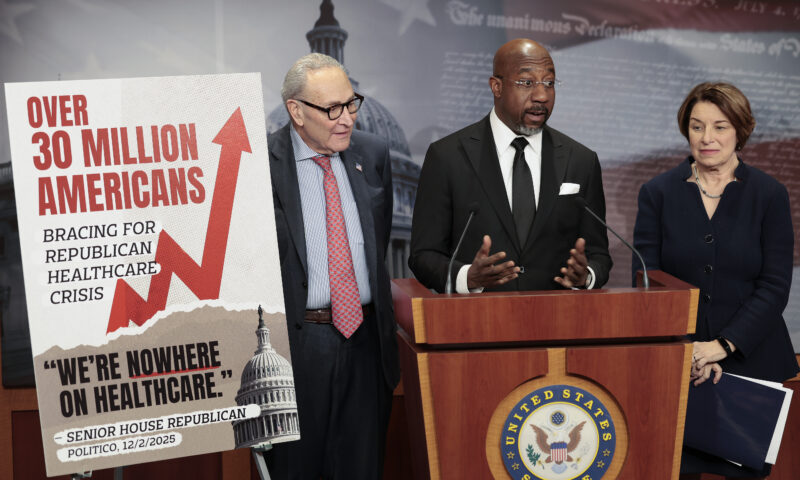Labor & Economy
Employers’ New BFF: DC Circuit Court of Appeals

The National Labor Relations Board (NLRB) is facing the greatest crisis in its 78-year history. On Thursday, May 16, the full Senate Committee on Health, Education, Labor and Pensions held a hearing on the president’s nominees — three Democrats, two Republicans — to the National Labor Relations Board. Without swift confirmation of these nominees, the NLRB will soon be reduced to zero members, and for the first time in board history, the president will be unable to appoint members by recess for at least a year. By blocking the nominations, Republicans appear intent on incapacitating the NLRB for much of the president’s second term.
For the past two years, Republicans and anti-union groups have gone all-out to stymie the work of the labor board, and they have found a powerful ally in the D.C. Circuit Court of Appeals. In January, in a decision that would have invalidated hundreds of presidential recess appointments over the past few decades, the D.C. Circuit ruled unconstitutional the president’s recess appointments to the board, throwing into question the status of several hundred NLRB decisions. In the wake of the court’s Noel Canning decision, employers are now challenging the legitimacy of almost every level of the board’s functions.
Then, during the first week in May, the D.C. Circuit struck down the board’s new rule on notice posting which the National Right to Work Committee called “outrageous.” Reasoning that in order to exercise their rights, workers first had to know of their existence, the board issued a rule requiring that employers post notices informing workers of their rights under the National Labor Relations Act. The NLRB first published the rule in August 2011, but influential employer groups and Congressional Republicans immediately sought to block it.
Given the uproar that it caused among anti-union organizations, one might believe that the rule required employers to post excerpts from the Communist Manifesto. But in reality it stated that employers must post a simple notice, similar to that required by virtually every other labor and employment statute, informing workers of their rights to form a union under federal law. Anticipating accusations of bias, the board’s notice also states that employees have a right not to join a union and that no one can coerce them into joining a union.
But this language cut no ice with the D.C. Circuit, which ruled that the notice-posting requirement violated employers’ free speech. According to the court, the board cannot compel employers to post the law of the land or penalize them for not posting it, because employers’ right against compelled speech cannot be “restricted to ideological messages.” Thus, it mattered nothing that the rule required employers to post federal law and not the Communist Manifesto. If employers do not believe that workers should have the right to form unions — which is supposedly protected by federal law — forcing them to post this notice violates their right to free speech.
The D.C. Circuit insisted that Congress did not authorize a regulation “so aggressively prophylactic” as the notice-posting rule. Perhaps the court believes that the real problem is that workers are too aware of their right to form a union or that employers are too compliant with the law. Regrettably, neither is true. Millions of young and immigrant workers are unaware of their legal rights, and employer violations of the law remain a widespread problem. But even without violating the law, employers can easily undercut workers’ right to organize. How many employees would feel comfortable announcing to their employer, “I think this workplace really needs a union”? Weak legal rights, fear of employer retaliation, and worker powerlessness have led to years of stagnating wages, growing employment insecurity and disappearing wages and benefits.
Predictably, anti-union organizations have hailed the court’s ruling as an “important victory.” Posting notices informing workers of their right to form a union, explained the National Association of Manufacturers, would “create hostile work environments where none exist.” Knowledge of federal law produces conflict at work, whereas ignorance of the law results in harmony. And in a statement that would be comical were it not so objectionable, the National Right to Work Committee celebrated the ruling as a “good day for workers.” When it comes to workers’ right to form a union, ignorance, apparently, is bliss.
Workers cannot exercise their legal rights if they do not know that those rights exist. But with the assistance of the D.C. Circuit, anti-union groups are determined to keep them in the dark. By blocking the confirmation of the President’s nominees to the NLRB, moreover, the GOP is all but ensuring that the board is unable to protect workers’ rights.
It seems there is little left that the GOP and the D.C. Circuit could do to erode any further the rights of American workers, but no doubt they will find a way.
(John Logan is Professor and Director of Labor and Employment Studies at San Francisco State University. His post first appeared on Truthout and is republished with permission)

-

 Latest NewsDecember 10, 2025
Latest NewsDecember 10, 2025Capital & Main, L.A. Times Win Sidney Award for Reporting on Child Farmworkers
-

 StrandedDecember 9, 2025
StrandedDecember 9, 2025Giving Up on the Dream: Asylum Seekers Try Other Options in Mexico
-

 Locked OutDecember 16, 2025
Locked OutDecember 16, 2025This Big L.A. Landlord Turned Away People Seeking Section 8 Housing
-

 Column - California UncoveredDecember 12, 2025
Column - California UncoveredDecember 12, 2025They Power the U.S. Economy, But Will Struggle to Afford Health Care
-

 The SlickDecember 19, 2025
The SlickDecember 19, 2025‘The Poor Are in a Very Bad State’: Climate Change Accelerates California’s Cost-of-Living Crisis
-

 Locked OutDecember 23, 2025
Locked OutDecember 23, 2025Section 8 Housing Assistance in Jeopardy From Proposed Cuts and Restrictions
-

 Column - State of InequalityDecember 11, 2025
Column - State of InequalityDecember 11, 2025A Little Place Called Home?
-

 Locked OutDecember 17, 2025
Locked OutDecember 17, 2025Credit History Remains an Obstacle for Section 8 Tenants, Despite Anti-Discrimination Law

